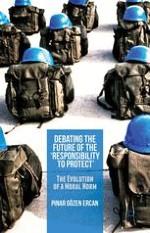2016 | OriginalPaper | Buchkapitel
5. Upholding the Responsibility?
verfasst von : Pınar Gözen Ercan
Erschienen in: Debating the Future of the ‘Responsibility to Protect’
Verlag: Palgrave Macmillan UK
Aktivieren Sie unsere intelligente Suche, um passende Fachinhalte oder Patente zu finden.
Wählen Sie Textabschnitte aus um mit Künstlicher Intelligenz passenden Patente zu finden. powered by
Markieren Sie Textabschnitte, um KI-gestützt weitere passende Inhalte zu finden. powered by
